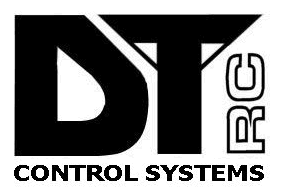

|
Prog4 Programmer
|
DESCRIPTION
Prog4 is used with a computer to change settings in DT receivers.
Prog4 creates a wireless link between the computer and the receiver.
Prog4 should work with all 'surface' receivers sold since October 2013 (Rx4x, Rx6x, Rx10x).
Prog4 requires a cheap serial cable (not included) and freeware file transfer software (not included).
HARDWARE
Prog4 is connected to a computer with an RS232 serial cable.

|
Prog4 Power with 5v USB (3.2-10v needed) |

|
RS232 serial cable Search for CH340, FTDI or similar USB-to-TTL serial adapter cable |

|
Green (TxD) = Pin7 input White (RxD) = Pin6 output Black = Negative - Red = Positive +5v |
SOFTWARE
One programming change is made at a time using a simple text file:

|
dt-type3.txt The file can have any name and only the top three rows are normally used The description to the right of the programming code is optional |
The text file is transferred to Prog4 with file transfer software.
CoolTerm is an example of freeware software.
Sparkfun suggest other options.
STEPS
Prog4 operates in 1-way mode (most receivers) and 2-way mode (Rx65b and Rx47).
Prog4 always starts up in 1-way mode. Both Prog4 and the receiver should display a 3-flash in this mode.
If a receiver is capable of 2-way mode, they should both automatically go into this mode and both display a solid led.
TEST CONNECTION
Send a dt-type0.txt file with 4,1 command to Prog4 with receiver switched off. Prog4 should reply by sending its version number back to Coolterm.
BINDING
Prog4 needs to be bound to each receiver once. Your receiver will still remember the bind info for your proper transmitter:
COMPATIBILITY / PROGRAMMING OPTIONS
Prog4 works with software released since October 2013. Compatible receivers and software versions are listed below. The receiver board ID (eg: 60b) is machine printed on the PCB. The version of the software is usually hand-written on the largest black chip on the receiver. If there are more than two numbers, use the first two numbers (top/left).
| Version | Marking | Rx60b | Rx61b | Rx61c | Rx62a | Rx63a | Rx65a | Rx65b |
| 610-x | 10x |
v610 |
v610 |
- |
v610 |
v610 |
v610 |
- |
| 611-x | 11x | - | - |
v611 |
v611 |
- | - |
v611* |
* 2-way Prog4 from v611-2
| Version | Marking | Rx41d-x-v5 | Rx43d-x-v5 | Rx45-v5 | Rx45-5-v5 | Rx45-22-v5 |
| 510-x | 10x |
v510 |
v510 |
v510 |
v510 |
- |
| 511-x | 11x | - | - | - | - |
v511 |
| Version | Rx102 | Rx105 |
| 110-x |
v110 |
v110 |
MORE DETAILS
| 1-way mode |
Prog4 has two primary modes of operation. When switched on it transmits like a standard transmitter. Receivers lock on to the signal and Prog4 acts as a surrogate transmitter. Prog4 uses one frequency, channel 81, which is not normally used by other 2.4 users. Communication is 1-way in this mode. Only one change is possible each time a file is transmitted. After 5 minutes of no activity, Prog4 will stop transmitting, the led will go off, and it will 'sleep'.
| 2-way mode |
Receivers that have space for larger programs can operate in a more advanced 2-way mode (Rx65b/Rx47). In this mode Prog4 can send larger files to the receiver so more than 1 change per file is possible. See next section for examples. The receiver informs Prog4 if the changes were applied successfully. The receiver can also send all its settings back to Prog4 to display on the PC. In this mode Prog4 only transmits when it has a file to send. It also goes into sleep mode after 5 minutes of no activity.
Prog4 always starts in the 1-way mode and changes to the 2-way mode automatically. The led on the receiver has a 3-flash pattern in 1-way mode and is on solid in 2-way mode. If you make changes in Rx65b/Rx47, you may wish to switch the receiver off to test a change with the proper transmitter. If you then wish to make another change and the Prog4 led is still on solid (not sleeping), then you can press the button on Prog4 briefly to restart the automatic connection process. Or (and if Prog4 led is off), switch Prog4 off and on
OTHER OPTIONS
All compatible receivers accept 'type3' files. Other 'types' and options are possible with some receivers:
type0 = commands
type1 = real-time changes (Prog1 equiv)
type2 = not implemented (Prog2 equiv)
type3 = normal programming (Prog3 equiv)
More details about types and file sizes
Sequenced light pattern examples
Multi-position channel examples